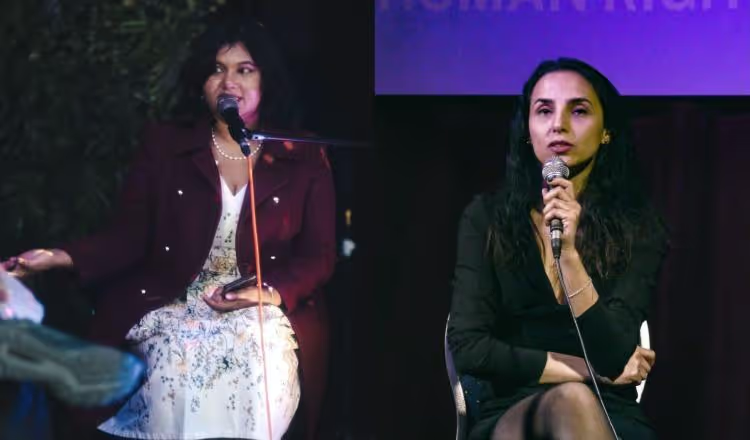Jannatun Nayeem Prity and Fatemeh Ekhtesari at RE:ACT Human Rights Mini Festivals

Under the initiative of engaging young people in issues of human rights and freedom of expression through arts and culture, Prity and Ekhtesari joined the programmes of two of the RE:ACT Human Rights Mini Festivals.
Bengali writer, artist, and activist Jannatun Nayeem Prity was the first to participate in the RE:ACT Human Rights Mini Festival in Aarhus. There, she read her from her upcoming book and told the story of her persecution in her home country of Bangladesh. The event in Aarhus also featured other young artists and writers, including Jaden Castro and Bana Mutibwa, amongst others.
Reflecting on her participation in the RE:ACT Mini Festival, Prity said:
‘The experience was very uplifting. I got a huge response from the audience after reading a chapter from my upcoming book- they wanted to know when it will be published. I was very glad to see it’
Sally Madsen Bjerre, the Project Leader of the Mini Festivals, highlighted Prity’s performance as the one which ‘made the biggest impression on people that day’. She added that both she and the crowd were ‘blown away by the power of Prity’s text and her performance’.
At the festival in Aalborg, it was Fatemeh Ekhtesari’s turn to address the young audiences through a poetry reading and a talk. During the latter, Fatemeh did not only share her personal story of art, activism, and exile, but also talked about the current situation in Iran, her home country. In her speech, Ekhtesari explored the strong links between the arts, culture, and political change, and the challenges posed by censorship and repression of artistic output. After her performance at the RE:ACT Mini Festival in Aalborg, Fatemeh said:
‘I am glad that even in small towns, events with the theme of freedom of expression are held. It is vital that we appreciate this freedom even if we live in a country like Denmark, with its good levels of freedom of speech. We should always protect it in our own thoughts and actions. You might think freedom will last forever, but the line between having and losing freedom is very narrow.’
On working with Jannatun Nayeem Prity and Fatemeh Ekhtesari, Project Leader Sally Madsen Bjerre said:
‘It has been such a pleasure working with both Fatemeh and Prity. There is no doubt that their work and personal stories have left a huge impression on our audience, and on us, those who organised the events. Learning about censorship from people who have experienced it and hearing them read the literature for which they faced criticism and oppression hits more strongly than any statistics or news articles. And many of the young people in the audience would not have even been aware of statistics and media content on these topics, so art is creating a path to important matters for a new group of young people’.
RE:ACT Human Rights is a collaboration led by Rapolitics and in collaboration with the Danish Institute of Human Rights and Roskilde Festival, as part of the Human Rights Alliance. The Mini Festivals seek to celebrate artistic activism, freedom of expression, human rights, and international solidarity. Rapolitics is a non-profit organisation, working to expand the democratic debate amongst young people through the means of culture and creative expression.



